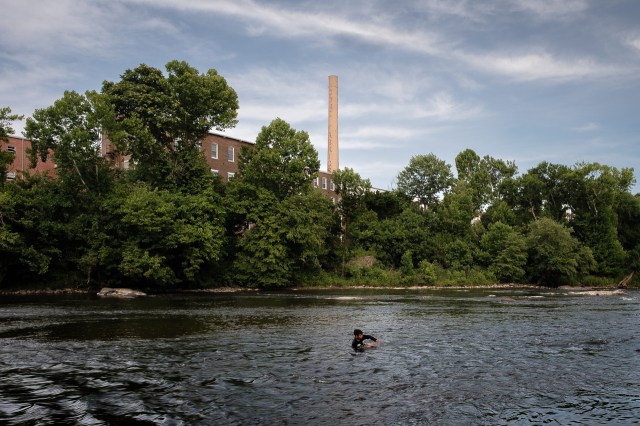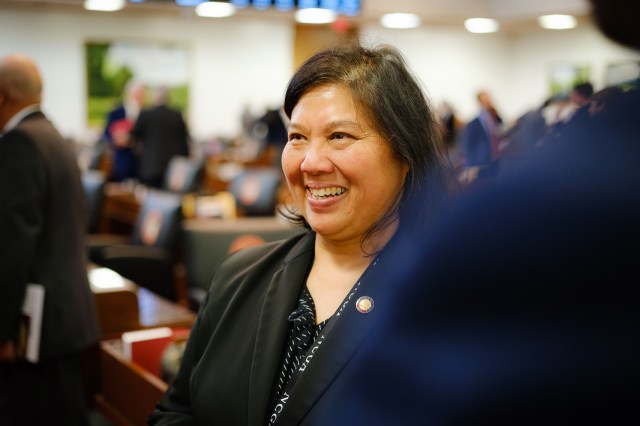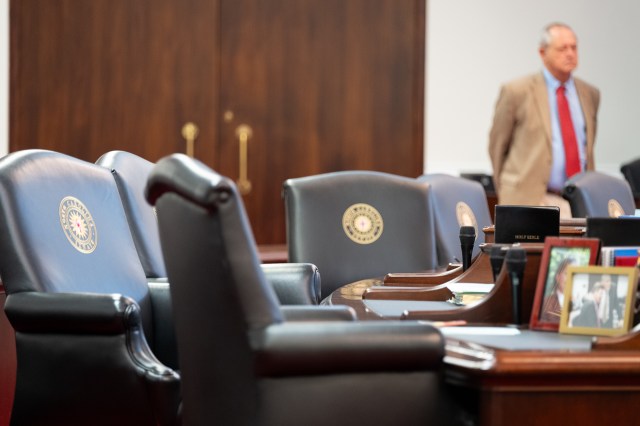Stay ahead of the curve as a political insider with deep policy analysis, daily briefings and policy-shaping tools.
Request a DemoNC budget negotiations, from chair’s perspective
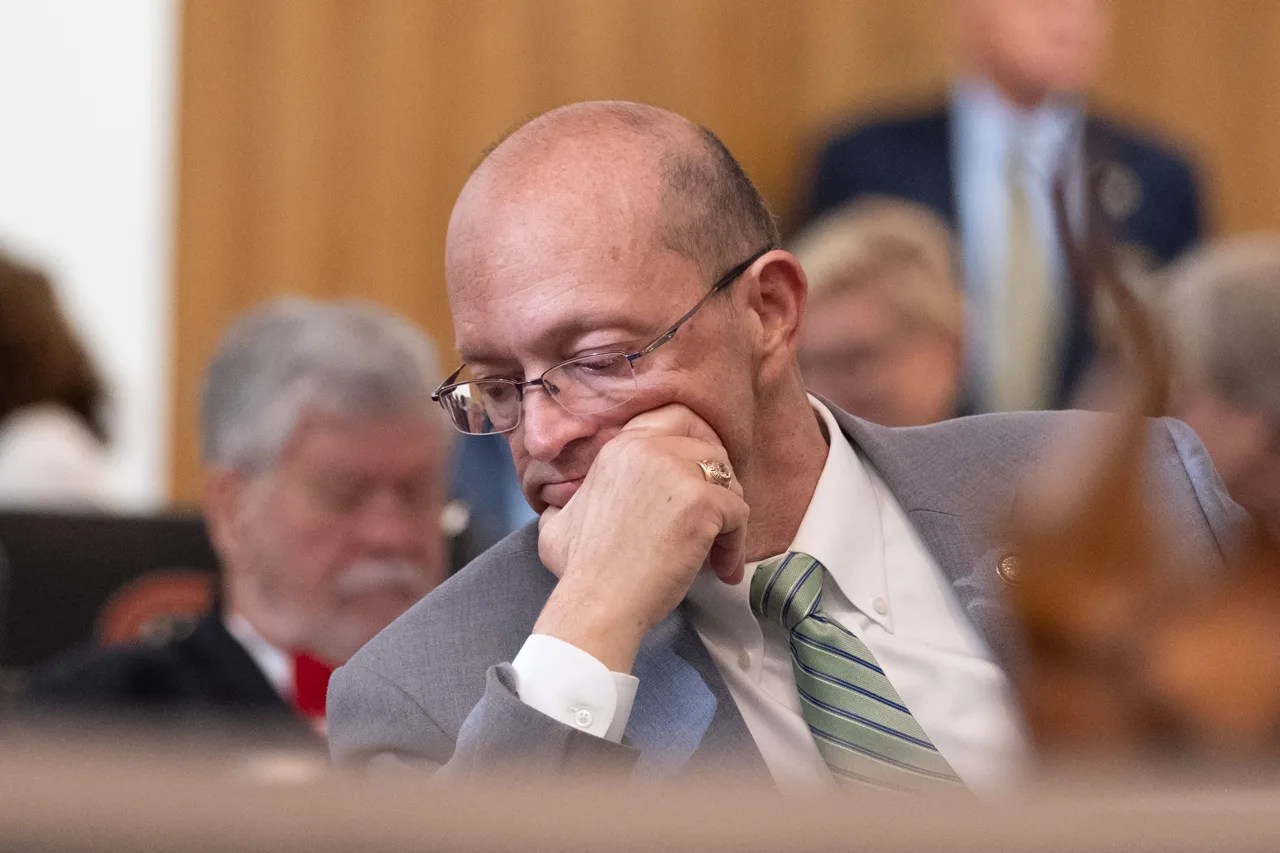
Rep. Dean Arp, R-Union, works at his desk on the floor of the North Carolina House of Representatives on May 1, 2024. (Credit: Clifton Dowell)
- An Appropriations chair describes the budget-writing process.
- Retired law enforcement K-9s get help with veterinary costs.
- NC Community Colleges “Propel NC” plan gets a boost.
Budget writing isn’t a spectator sport. Spending $32 billion takes time — especially when there’s disagreement over priorities — and most of the work on the summer’s signature piece of legislation goes on behind closed doors.
Rep. Dean Arp, R-Union, was asked what people would find noteworthy if they were allowed to witness budget negotiations.
“Well, I hope, the depth and the breadth of what we do,” Arp said. No decisions are “willy-nilly.”
Arp, one of three senior chairs of the House Appropriations Committee, said that budget writers rely on staff heavily and that real-time research needs to be done about federal grants and requirements when some changes are considered.
“You know, the economic system is not static,” Arp said. “And so when we ask questions, we don’t like something, we don’t understand, [staffers] go back and give us information.”
Arp said budget discussions began about a month before the session reconvened in April. He estimated the committee had gone over 50%-60% of the budget when legislators learned of the downward revision in the state’s revenue outlook.
The Associated Press reported earlier this month that a projected state revenue surplus through mid-2025 was reduced by $430 million because of lower than expected April tax collections.
Arp said much back-and-forth happens between the various Appropriations subcommittees and the chairs. “We have given [tasks] out to the budget areas,” he said. “They have been coming back and reporting on changes based on their conversations with the agencies and what the agencies’ requests are.”
Arp said the work is hard and no one can do everything they might like. A natural tension is built into the system, particularly in divided government, so decisions are rarely rapid between the House, the Senate and the governor.
“It’s an extremely deliberative process just to be very responsible with the funds that are the people’s money,” Arp said.
“I wouldn’t describe it as fun. I would describe it as important.” — Clifton Dowell
Reading for tomorrow’s NC Insider
- Berger on mask bill | Avi Bajpai, N&O
- Budget talks stall | Dawn Baumgartner Vaughan, N&O
- UNC System repeals DEI policies | Kelsey Coffey & Brian Murphy, WRAL
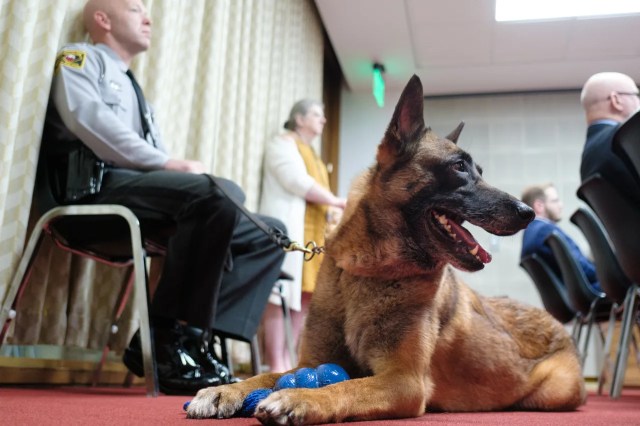
The House State Personnel Committee approved a measure that would help pay for the medical care of retired law enforcement K-9s. House Bill 1042 sponsor Rep. Karl E. Gillespie, R-Macon, said he’s worked with the Department of Public Safety, the U.S. Police Canine Association and the North Carolina Sheriffs’ Association in developing this legislation. The bill would provide a reimbursement of $1,500 each year.
Rep. Dudley Greene, R-McDowell, said handlers of these dogs take care of them far beyond their time of service. “Oftentimes, it becomes their responsibility to pay for the care of these dogs,” Greene said. “I know this will go a long way to encourage people to stay in the K-9 position or take on a K-9 position if they know they’re not going to be saddled with that responsibility.”
The ASPCA’s state legislative director, John McHugh, said he fully supports the use of animals in law enforcement provided they have human treatment. — Matthew Sasser
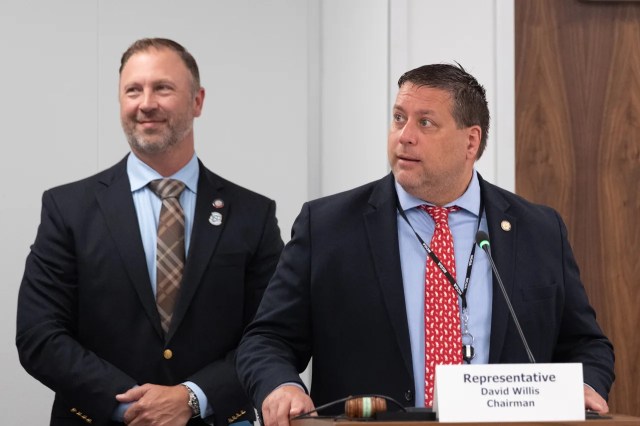
Also on Thursday, Rep. Matthew Winslow, R-Franklin, presented House Bill 1069 to the House Education Committee on Community Colleges. The legislation mirrors the Propel NC proposal from the North Carolina Community College System. It would create a better workforce development system; increase funding for high-demand, high-wage jobs; and change the existing funding model, which has been in effect since 1980.
The measure received a favorable report. Tom Looney, chairman of the North Carolina State Board of Community Colleges, said he developed a detailed plan that has the endorsement of all 58 community college presidents and over 200 endorsements from hospital chains and chambers of commerce.
“I believe, with everything I’ve learned through my career, community colleges are the most important organizations in our state today,” Looney said. “If we’re going to continue to be the No. 1 state for business, we’ve got to get this right, and Propel is the first step, and we’ve got to move at the speed of business.” — Matthew Sasser
Know the most important news affecting North-carolina
Get our free weekly newsletter that covers government, policy and politics that impact your everyday life—in 5 minutes or less.
Global ‘Rights of Nature’ movement touches down in NC
Two bills introducing a novel legal concept have landed with a thud in the House Rules Committee, but supporters believe the idea might someday provide a better foundation for environmental law in the United States. House Bills 795 and 923 fall within a larger international movement known as Rights of Nature and would essentially give the Haw and Dan …
Mending the divide: Institute shapes future North Carolina leaders
A Confederate monument in Alamance County was dividing the community in half, sparking a war of words and strong emotions over the question of whether the statue was preserving history or honoring hate. At the time, Amy Galey, chair of the Alamance County Commission, called up an old friend for advice, hoping he might help …
Insider Afternoon Update for June 6, 2024
The conference report on the so-called “mask ban bill” sailed through the Senate without opposition Thursday, but only because every Democrat was absent from the chamber when the vote took place. The conference report adds an exemption for people who need to wear masks for medical reasons, but also makes a change to campaign financing law that …
AKC visits NC legislature with dogs, treats
When it comes to lobbying, likability never hurts, so some groups have a natural advantage. “I don’t think I have ever met an anti-dog legislator,” said Sheila Goffe, vice president, government relations, at the American Kennel Club. The group was set up on Halifax Mall Wednesday with baskets of treats — both canine and human — …
